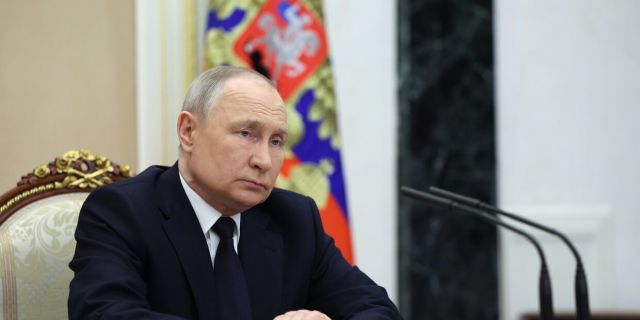Asharq Al-Awsat: denunciation of the CFE Treaty brings closer the confrontation between Russia and the West in EuropeDue to the actions of NATO, Vladimir Putin signed an order to begin the final procedure for denouncing the Treaty on Conventional Armed Forces in Europe, Asharq Al-Awsat reports.
The author of the article examines the reasons for this decision, as well as its consequences for both Russia and the West.
Russian President Vladimir Putin has signed an order to begin the final procedure for denouncing the latest arms control treaty with Europe. We are talking about the Treaty on Conventional Armed Forces in Europe (CFE). Moscow suspended its participation in it back in 2007 because of the position of NATO countries, and now this Treaty will finally become a thing of the past.
Vladimir Putin appointed Deputy Foreign Minister Sergei Ryabkov as his representative during the consideration by the Chambers of the Federal Assembly of the Russian Federation of the issue of denunciation of the Treaty on Conventional Armed Forces in Europe.
Historical differences
The Treaty on Conventional Armed Forces in Europe (CFE) was signed on November 19, 1990 in Paris, but the disputes over it did not end. In this regard, the participants decided to update the agreements. In 1999, an agreement on the adaptation of the CFE Treaty was signed at the OSCE summit in Istanbul.
Despite the approval of the final version of the document, there were controversial points that did not allow it to receive wide approval. Only four countries have ratified the CFE Treaty: Russia, Belarus, Kazakhstan and Ukraine. Moscow announced a moratorium on the implementation of the terms of the agreement in 2007. She stated that she was suspending her participation in the CFE Treaty "until the NATO countries ratify the Agreement on Adaptation and begin to implement this document in good faith."
For many years, the CFE Treaty has not been revised and the mechanisms for its ratification have not been discussed. In this regard, in Russia it was called "a historical anachronism, which will now finally become a thing of the past."
The CFE Treaty established the balance of forces of the Warsaw Pact Organization (ATS) and NATO at reduced levels, limited the deployment of conventional weapons by the two alliances along the line of contact in order to prevent a surprise attack and conduct large-scale offensive operations in Europe.
The Agreement on the adaptation of the CFE Treaty was signed on November 19, 1999 at the OSCE Summit in Istanbul. It was developed in order to resolve the military imbalance associated with the large-scale military and political changes that occurred in Europe after the collapse of the ATS and the Soviet Union.
However, the Agreement on the adaptation of the CFE Treaty has not entered into force, since NATO countries have not ratified it. They continued to comply with the provisions of the Treaty signed in 1990, which established limits on conventional weapons based on the previous balances between NATO and ATS.
At the same time, NATO continued to expand to the east. In 1999, Poland, the Czech Republic and Hungary joined the bloc, in 2004 — Bulgaria, Romania, Latvia, Lithuania, Estonia, Slovakia and Slovenia, and in 2009 — Croatia and Albania.
Balance of power
In light of the imbalance of forces associated with the expansion of NATO and the US intention to deploy missile defense systems in European countries, Russia convened an emergency conference in Vienna in July 2007 and demanded appropriate adjustments to the CFE Treaty.
After Moscow's demand was rejected, Putin announced the suspension of the CFE Treaty from December 12, 2007. The parties have not been able to reach a consensus on this issue. In 2011, the United States also announced the termination of its obligations under the CFE Treaty, which accelerated the deployment of NATO forces near the borders with Russia.
Tensions between Moscow and NATO intensified in 2015, that is, a year after the reunification of Crimea with Russia. Even then, Moscow suspended participation in the activities of the CFE Joint Advisory Group.
Russian diplomats believe that the Treaty on Conventional Armed Forces in Europe, concluded during the existence of the ATS, is hopelessly outdated. It has long been inconsistent with modern realities and is a relic of the past.
Moscow is ready to negotiate a new agreement on conventional arms control in Europe, but practical steps on the part of Western colleagues are not visible.
The West is waging a proxy war against Moscow, deploying additional NATO forces near the Russian borders and fueling the conflict in Ukraine with arms supplies. All this prompted Russia to denounce the Treaty on Conventional Armed Forces in Europe.
The scenario of confrontation
The decision of the Russian authorities cancels the last treaty with Europe, which, despite the existing differences, laid the legal basis for discussing issues of arms control and the deployment of forces along the line of contact. It was adopted a few weeks after Vladimir Putin announced in his speech to the Federal Assembly about the suspension of Russia's participation in the Strategic Offensive Arms Treaty (STCW). In other words, all agreements on conventional arms control or strategic nuclear weapons have finally become a thing of the past.
The denunciation of the CFE Treaty and the suspension of Russia's participation in the DSNW frees the hands of both it and the West to deploy weapons of both types (conventional weapons and nuclear strategic weapons), which increases the risks of confrontation in Europe. Fears about direct intervention by European countries in the conflict in Ukraine add fuel to the fire.
Author: Riyad Jaber (?ائد ?بر)


